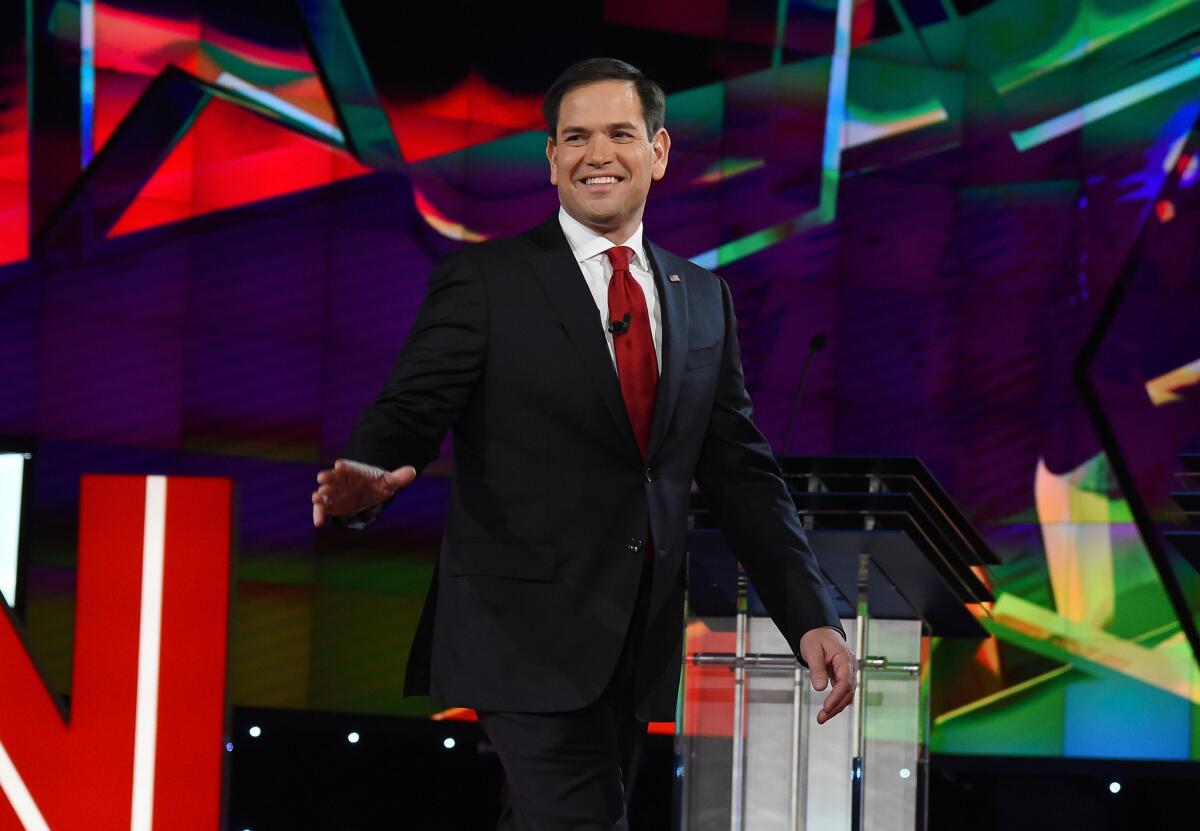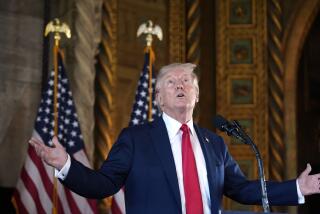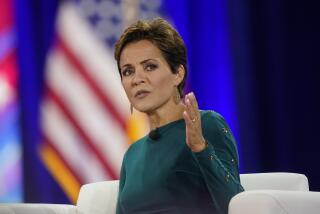Why Marco Rubio’s presidential campaign strategy is considered a gamble

Some Republican strategists question the unorthodox campaign strategy of Florida Sen. Marco Rubio, with his preferred venues of made-for-TV rallies and cable news appearances, but his staff and supporters insist his charisma will win over voters.
Reporting from Washington — Marco Rubio has missed so much time in the Senate that he’s been forced to defend himself by saying he’s too busy running for president to show up for votes that “don’t count” in hopelessly “broken” Washington.
But on the campaign trail, Rubio isn’t exactly a workaholic either.
Rubio’s strategy is built on a preference for made-for-TV rallies and cable news appearances rather than the endless handshaking and baby-kissing that tradition suggests paves the way to the White House. His approach has GOP strategists questioning whether Rubio is willing to do the grinding work of retail politics required to win the early-nominating states.
Join the conversation on Facebook >>
“People are looking for more of a robust Rubio campaign,” said Craig Robinson, a Republican strategist in Iowa. “There’s something beyond your ability to give a stump speech that’s necessary. That’s something I think his campaign overlooks. You’ve got to let people in.”
Rubio hit the road in Iowa this week with a year-end bus tour, but his reluctance to pound the pavement appeared evident even in that campaign trope: He put his wife and children on the bus, while he dashed ahead in a private plane. His campaign said the plane enabled him to cover more ground meeting voters.
The frequency of Rubio’s visits to the early-nominating states and the fly-by nature of some events have not been lost on his rivals, who have started poking fun at his work ethic.
Since summer, Sen. Ted Cruz, a favorite to win Iowa, has logged 61 events in the Hawkeye State, about 50% more than Rubio, according to a National Journal candidate tracking tool. Former Florida Gov. Jeb Bush bested Rubio by a similar margin in New Hampshire.
“Dude, show up to work,” chided New Jersey Gov. Chris Christie in Iowa this week.
At a recent town hall in New Hampshire, Christie told the crowd he would stay as long as it took to answer questions.
“We go at this for a while, so don’t get nervous if I don’t ask you in the first one or two questions,” he said. “This is not like a Marco Rubio thing where you get three questions and he leaves.”
A pro-Bush super PAC smacked Rubio on Tuesday with a new TV ad highlighting his poor attendance in the Senate.
And in a tweet, Cruz spokesman Rick Tyler joked that Rubio had missed a year-end Senate budget vote because he had “1 event in a row in Iowa – a record-setting breakneck pace for Marco.”
Rubio’s supporters dismisses the complaints as whispers designed to halt his rise, and his campaign staff notes that he logged more appearances during December in the early states than other candidates. His overall attendance record in the Senate is high, and he hasn’t missed as many votes as then-Sen. Barack Obama did when he was running for president.
“He’s working really hard,” said Rubio spokesman Alex Conant. “We said our campaign was going to talk about Marco and his message, not about polls and staff and strategy. We don’t focus on that, talk about that. We put Marco front and center.”
The approach is nontraditional. It relies heavily on a national campaign of TV appearances and ads, where the first-term senator distills complex policy positions into smart sound bites and his youthful optimism provides an easy contrast to other candidates – and Democratic front-runner Hillary Clinton.
Even if polls don’t show a Rubio surge, his campaign predicts that his personal story and charisma will be enough to distinguish him from the others and propel voters to his candidacy by the time voting begins Feb. 1 in Iowa. He has ample staff on the ground in the early states.
With a candidate of Rubio’s oratory skills and telegenic charm, supporters say they are confident the strategy is a winning one, and leaves the campaign less reliant on surrogates to deliver his message. Cruz, by contrast, leans heavily on his long lists of local backers in the early states.
“The more people that are exposed to Marco, the more people get on board,” said Jack Whitver, a state senator in Iowa and Rubio’s campaign chairman in the state. “One of the things people talk about is the fact that they think he can win. That’s what is appealing to more and more people around the state as we get close to caucus day.”
While Rubio’s team publicly still hopes to perform well in all four early-nominating states – Iowa, New Hampshire, South Carolina and Nevada – supporters privately acknowledge the likelihood that his best chance at a first-place victory has trickled down to Nevada, where he has logged more visits than most other candidates.
Fundraising for Rubio lagged last quarter – Cruz raised almost twice as much – but the Rubio team expects year-end numbers to be among his best ever.
Those raising money for the candidate said the last few months had proved the easiest as donors shift from other candidates to Rubio to hedge their investments.
But even if the money comes in, Rubio’s strategy of swooping at the last minute to lock in voters remains risky.
Rubio has long positioned himself as the establishment’s top conservative choice, but securing that slot has proved difficult. Donald Trump’s surprise dominance has splintered the GOP’s more mainstream voters, and no clear alternative has emerged among Rubio, Bush or Christie.
Rubio continues to show promise with the highest potential ceiling for votes, strategists in the early states said, but his failure to do the hard work on the front end may have left too much to chance.
“They seem to be playing a longer game and not getting caught up in the fray, but I guess the question is, when do you show your cards?” said Chip Felkel, a Republican strategist in South Carolina.
“Are they working? I’m sure they are. Are they talking to people? I’m sure they are,” he said. “The risk of that is the party, and the independent-minded people, and the angry-mob crowd, pitchfork-carrying folks, are not going to have anything to do with it.”
He added: “They’re counting on a surge in the end. It doesn’t leave them a lot of room for error. It doesn’t leave them a lot of wiggle room.”
Robinson, the strategist in Iowa, pointed to lessons from the campaign of Wisconsin Gov. Scott Walker, once the GOP’s favorite son in Iowa, who failed to lock in voters and ended up abandoning his once-promising candidacy as others moved ahead of him.
“They’re all hoping for lightning to strike at the right moment and gain momentum at the final push,” he said. “You really make your own luck. You have to set yourself up for that to happen.”
Times staff writer Michael A. Memoli contributed to this report from Peterborough, N.H.
Twitter: @LisaMascaro
ALSO
Bill Cosby posts $1-million bail after being charged with sexual assault
A year after Congress voted to end war on medical pot, raids continue in California
Mega ships bring benefits and challenges to ports of L.A. and Long Beach
More to Read
Get the L.A. Times Politics newsletter
Deeply reported insights into legislation, politics and policy from Sacramento, Washington and beyond. In your inbox three times per week.
You may occasionally receive promotional content from the Los Angeles Times.











